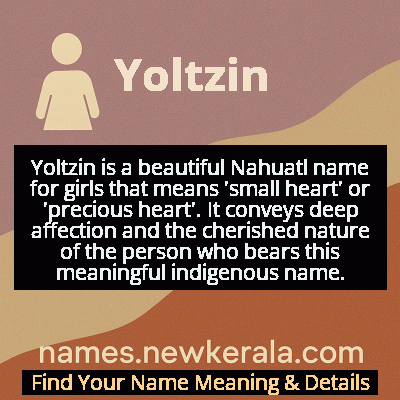Yoltzin Name Meaning & Details
Origin, Popularity, Numerology Analysis & Name Meaning of Yoltzin
Discover the origin, meaning, and cultural significance of the name YOLTZIN. Delve into its historical roots and explore the lasting impact it has had on communities and traditions.
Name
Yoltzin
Gender
Female
Origin
Nahuatl
Lucky Number
4
Meaning of the Name - Yoltzin
Yoltzin is a beautiful Nahuatl name for girls that means 'small heart' or 'precious heart'. It conveys deep affection and the cherished nature of the person who bears this meaningful indigenous name.
Yoltzin - Complete Numerology Analysis
Your Numerology Number
Based on Pythagorean Numerology System
Ruling Planet
Uranus (Rahu)
Positive Nature
Strong sense of order, loyal, practical, and disciplined.
Negative Traits
Stubborn, overly serious, rigid, and prone to feeling restricted.
Lucky Colours
Blue, gray.
Lucky Days
Saturday.
Lucky Stones
Blue sapphire.
Harmony Numbers
1, 7, 8.
Best Suited Professions
Managers, engineers, accountants, organizers.
What People Like About You
Dependability, discipline, practicality.
Famous People Named Yoltzin
Yoltzin García
Indigenous rights activist
Founded educational programs for Nahuatl-speaking communities in Mexico
Yoltzin Flores
Traditional healer and midwife
Preserved and taught traditional Nahua healing practices to younger generations
Yoltzin Mendoza
Cultural anthropologist
Documented and revitalized Nahuatl oral traditions and storytelling
Yoltzin Xochitl
Artist and textile designer
Modernized traditional Nahua textile patterns for contemporary fashion
Name Variations & International Equivalents
Click on blue names to explore their detailed meanings. Gray names with will be available soon.
Cultural & Historical Significance
The name reflects the Nahua worldview where the heart symbolized not just emotion but also wisdom, courage, and the vital force that animates human existence. It represents the belief that even the smallest heart contains immense spiritual potential and value. In contemporary indigenous communities, names like Yoltzin serve as important cultural markers that maintain linguistic and spiritual connections to ancestral traditions, while also asserting indigenous identity in modern multicultural societies.
Extended Personality Analysis
Individuals named Yoltzin are often characterized by their emotional depth, compassion, and strong intuitive abilities. They tend to be deeply empathetic, with a natural capacity for understanding others' feelings and providing emotional support. Their 'small heart' suggests not weakness but rather a concentrated, intense emotional intelligence that allows them to form profound connections with people. Yoltzins typically possess a quiet strength and resilience that belies their gentle nature, often demonstrating remarkable courage when defending their values or protecting loved ones.
These individuals are frequently creative, artistic, and spiritually inclined, with a strong connection to their cultural heritage and traditions. While they may appear reserved initially, Yoltzins form deep, lasting relationships and are known for their loyalty and nurturing qualities. Their emotional sensitivity makes them excellent mediators and caregivers, though they may need to consciously protect their own emotional boundaries. The name's meaning often manifests in a personality that balances tenderness with inner fortitude, creating individuals who are both compassionate and remarkably strong in their convictions.
Modern Usage & Popularity
In contemporary times, Yoltzin has experienced a revival as part of the broader movement to reclaim and preserve indigenous Mexican names and cultural heritage. While still relatively uncommon, its usage has grown significantly among families seeking to honor their Nahua roots and among those appreciating its beautiful meaning and cultural significance. The name is primarily used in Mexico, particularly in regions with strong Nahuatl-speaking communities like Puebla, Veracruz, and Guerrero, but has also gained some popularity among Mexican diaspora communities in the United States. Modern parents often choose Yoltzin for its unique sound, deep cultural resonance, and the positive qualities it represents. The name appeals to those seeking meaningful alternatives to more common Spanish or English names while maintaining a connection to Mesoamerican heritage, reflecting a growing pride in indigenous identity and cultural preservation efforts.
Symbolic & Spiritual Meanings
Symbolically, Yoltzin represents the concept of the heart as the center of emotional, spiritual, and intellectual life. The 'small heart' metaphor suggests concentrated emotional power, purity of intention, and the idea that great love and wisdom can reside in even the most modest vessel. In Nahua symbolism, the heart was associated with the sun and represented the vital force that animates all living beings. Yoltzin thus symbolizes the sacredness of emotional life, the courage to feel deeply, and the spiritual significance of human connection. The name carries connotations of preciousness, tenderness, and the idea that true strength comes from emotional authenticity rather than physical power. It represents the belief that the most profound truths and most powerful forces in the universe are often found in the smallest, most intimate spaces of human experience, making it a name rich with spiritual and philosophical significance.

